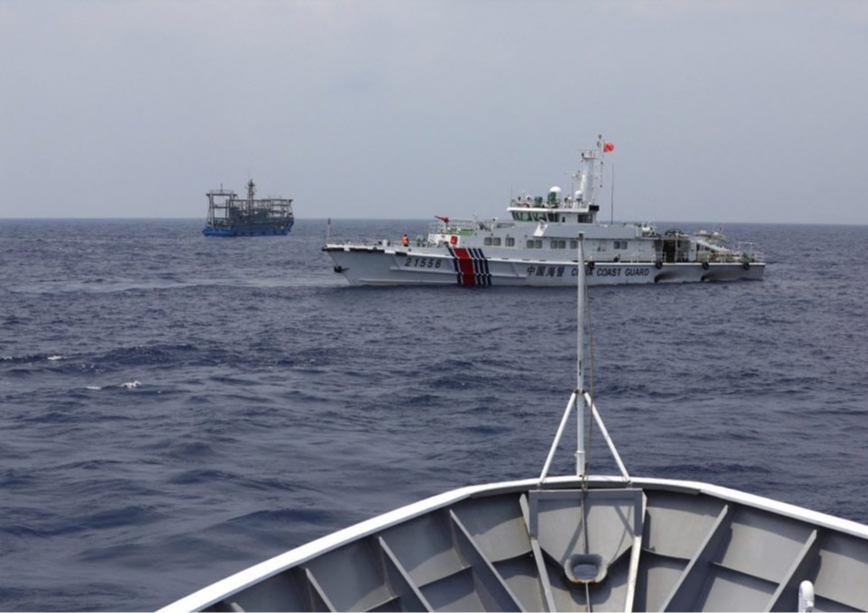
On 11 April, the first trilateral summit between the United States (US), Japan, and the Philippines was held in Washington. This was preceded by the first-ever military exercise between the US, Japan, the Philippines, and Australia in the South China Sea on 7 April.
Not very long ago, in September 2022, the US, Japan, and the Philippines held the first “Trilateral Defense Policy Dialogue” and decided to deepen cooperation in areas such as maritime security, humanitarian relief, and disaster response. Again, in December 2022, the US Army and Marine Corps in the Pacific, the Armed Forces and Marine Corps of the Philippines, and the Japan Ground Self-Defense Force held their first trilateral meeting in Tokyo, laying the foundation for regular high-level talks between the ground forces of the three countries. In June 2023, the heads of the national security agencies of the US, Japan and the Philippines held the first Trilateral Security Dialogue, marking a new level for the security cooperation mechanism between the three. In July and September 2023, the foreign ministers of the three countries met for the first time to advance cooperation on “economic security, development, humanitarian assistance, maritime security, and defence”. In September 2023, Japanese Prime Minister Kishida, Philippines President Marcos, and US Vice President Harris again met to further deepen trilateral cooperation.
The rapid development of the trilateral ties between the US, Japan, the Philippines and “the linking of the South China Sea–East China Sea dispute and the Taiwan issue” has set the alarm bells ringing in Beijing.
Now, the buzz on the Chinese internet is that, in less than a year of holding the first Defense Ministerial Dialogue, the four countries—the US, the Philippines, Japan, and Australia—may now get integrated into a new “quadrilateral security mechanism”. The rapid development of the trilateral ties between the US, Japan, the Philippines and “the linking of the South China Sea–East China Sea dispute and the Taiwan issue” has set the alarm bells ringing in Beijing.
The Chinese assessment is that a centralised and integrated regional security architecture is increasingly taking shape in the Indo-Pacific region, with the US as the core, the quadrilateral security mechanism as the focus, and multiple sets of “mini-multilateral” mechanisms as the supplement.
Hu Xin, Assistant Researcher at China South China Sea Research Institute, in an article in the Guancha.com, argued that in recent years, the US alliance system in the Indo-Pacific region has undergone important changes
1. It has achieved substantial internal integration, in terms of goals, structure, and members.
- In terms of goals, the alliance system formed by the US after World War II had a relatively loose structure and lacked a unified strategic goal. But now, a common strategic threat perception from China has become a common goal binding together the US alliance system.
- In terms of structure, the original bilateral alliance system (between the US and regional states, including Japan, South Korea, the Philippines, and Thailand) format has been transformed into a “latticework of mini-lateral arrangements” between the US and its various alliance and security partners in the region. This is playing an important role in legitimising the geographical scope of its alliance system in the Indo-Pacific.
- The US is promoting military and security dialogue and cooperation among the member nations (allies/partners) to facilitate better integration, communication and management within its alliance system. For example, countries such as Japan and the Philippines, Japan and Australia, Japan and India, India and Australia, India and South Korea have all established a "2+2" dialogue mechanism between each other’s foreign and defence ministers.
The US alliance system is also undergoing an outward expansion, in terms of involving non-resident nations in regional affairs and incorporating issues beyond the traditional security and defence domain.
Japan and India have established a "Special Strategic and Global Partnership"; Japan and Australia have formed a “Comprehensive Strategic Partnership” with Vietnam; Australia and India have upgraded their bilateral relations to a Comprehensive Security Partnership in 2020; in 2022, Japan and Australia have signed the "Joint Declaration on Security Cooperation”. Now Japan and the Philippines are negotiating the signing of a reciprocal troops access agreement.
2. The US alliance system is also undergoing an outward expansion, in terms of involving non-resident nations in regional affairs and incorporating issues beyond the traditional security and defence domain. For example, it is noted with concern in Beijing how the United Kingdom, France, and Germany have been made a party to the Indo-Pacific politics, by encouraging them to establish 2+2 dialogues with the countries in the region, deploying warships or taking part in high-level military exercises, etc.
Apart from that, further adding to China’s challenges, the US alliance system is no longer focused on high-political single issues such as security and defence but is being extended to low-political and diverse functional issues such as economy and trade, infrastructure, supply chains, and new energy. This “cross-disciplinary” nature of the mini-laterals, Hu Xin highlighted, has been further enhancing the intensity and expanse of the US’s “de-Sinicization/de-coupling from China” strategy.
Beijing managed to host Indonesia's President-elect Prabowo Subianto within 10 days of being elected and sought his assurance for the continuation of predecessor Joko Widodo’s friendly policy towards China.
Meanwhile, to counter the perceived strengthening of the US alliance system in Asia, China has intensified its ASEAN outreach. In a symbolic move, Beijing managed to host Indonesia's President-elect Prabowo Subianto within 10 days of being elected and sought his assurance for the continuation of predecessor Joko Widodo’s friendly policy towards China. Soon after that, Chinese Foreign Minister Wang Yi held back-to-back talks with foreign ministers from Lao and Timor-Leste. Wang Yi will soon start a six-day visit to Indonesia, Cambodia, and Papua New Guinea. The hope is to use China’s significant influence on certain AEAN members to restrain the Philippines.
On the other hand, some Chinese scholars are of the opinion that despite the strong posturing on Taiwan as well as the South and East China Sea issue, the US may find it difficult to deliver in actual terms. The reasons are that, domestically, internal political divisions constrain the Congress and internationally, the turmoil in Ukraine, Israel, and the Korean Peninsula is holding it back from directly challenging China. Instead, the US, they argue, will be forced to send Treasury Secretary Yellen or Secretary of State Blinken to keep the talks going and eventually accommodate China’s aspirations to a certain extent. Thirdly, the Chinese side is also hopeful that the uncertainty associated with a possible Trump 2.0 administration may eventually reverse the Biden administration’s gains so far, in terms of strengthening the US alliance system and thereby indirectly benefit China.
For India, as the Line of Actual Control (LAC) situation remains stuck in a stalemate, we must keep a close eye on the developments on China’s other fronts—namely, the South and East China Sea and the Taiwan Strait, so as to leverage them for our interest.
Antara Ghosal Singh is a Fellow of the Strategic Studies Programme at the Observer Research Foundation.
The views expressed above belong to the author(s). ORF research and analyses now available on Telegram! Click here to access our curated content — blogs, longforms and interviews.




 PREV
PREV

